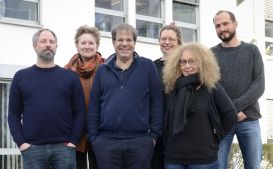Social, Cultural and Economic Inequalities
Our research group investigates social inequalities from a multidimensional and longitudinal perspective. In particular, we focus on distinct dimensions and processes of social inequality as well as class and milieu-specific dynamics of inequality on the societal level. From left to right: Jean-Yves Gerlitz, Susan Westing-Kilian, Olaf Groh-Samberg, Nora Waitkus, Theresa Büchler, Nepomuk Hurch, missing: Julia Neuhof and Martin Bacher
From left to right: Jean-Yves Gerlitz, Susan Westing-Kilian, Olaf Groh-Samberg, Nora Waitkus, Theresa Büchler, Nepomuk Hurch, missing: Julia Neuhof and Martin BacherThe persistent and distinct rise in economic inequalities poses new challenges to modern welfare societies. In Germany, poverty has not only risen, but has also become more persistent - as in many OECD countries. At the same time, we find an immense accumulation of wealth and fortune.
In this process of polarization, the middle classes do not represent a stable center anymore. Instead, they find themselves in between the aspiration of upward mobility and the fear of downward mobility. They are thus facing multiple irritations or uncertainties about increasing insecure status maintenance.
Most research on social inequality has focused on the relationship of economic growth and welfare expansion during the past decades. Further, despite overall increasing life chances, relative inequality of opportunity remains persistent.
However, economic inequalities were largely neglected. Despite educational expansion and changes in the occupational structure, real incomes remain stagnant and polarization continues to rise. While the influence of welfare arrangements on the structures of economic inequalities are well known, we know little about how structures of inequality and welfare states affect processes and patterns of social mobility. This is true despite strong social policy claims about equality of opportunity. Our research and teaching activities exist at the epicenter of these interactions.
In detail we investigate the following topics:
- Economic inequalities, especially processes of poverty consolidation, but also developments in income and wealth inequality and mobility. We present our analysis of poverty developments in Germany based on a multidimensional longitudinal poverty indicator on a regular basis.
- Educational inequalities, especially processes of intergenerational transmission of educational strategies and the influence of familial status dynamics in the course of education.
- Changes of class structure and class specific life-course patterns. With the help of longitudinal data and dynamic analytical methods we try to empirically asses the theoretical perspectives of Bourdieu’s class sociology.
- Life-course patterns of different social classes and milieus, especially the impact of rising social and economic inequality and changing welfare state policies on the middle classes.
- Structures and processes of wealth accumulation.
- Processes of intergenerational social mobility and in this context the structures of social inequality.
More information:
Members of the Working Group
Projects of the Working Group
Publications of the Working Group











